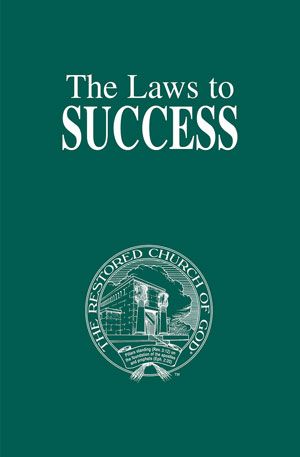Many differing opinions on why the debt crisis—and how to take control of your finances—fill newspapers, magazines, radio programs and books. Prominent financial counselors offer seemingly endless advice that, while often helpful, does not analyze the crux of this subject.
If so many “experts” have so many theories (most often contrary to what other “experts” say), how does one know which advice to follow? Where can people find real solutions to their real problems?
The answer is the Bible—God’s Instruction Manual! Just as there are manuals for how to operate certain complicated machines and devices, the Creator God included an Instruction Manual for the most complicated, delicate and complex creation ever made—man. Only by carefully following the guidelines—laws—listed in this Manual, can humanity properly live and achieve success.
Think of the following. God has created laws to govern every aspect of His creation. His laws govern everything. Just as the laws of gravity and inertia govern certain portions of His creation, God has financial laws that govern all aspects of money matters. By following these laws, people can ensure their financial security.
In John 10:10, Christ says, “I am come that they might have life, and that they might have it more abundantly.” The apostle John writes, “Beloved, I wish above all things that you may prosper and be in health, even as your soul prospers” (III John 1:2).
Most do not understand that specific laws govern virtually every action in life. The law of cause and effect, where there is an action for every reaction, is active in financial matters. There is a way—a direct path!—to prosperity and financial freedom. Christ clearly explains this in Scripture. If this were not true, then Christ would not have inspired John to record that His way brings abundant living to all who practice it.
But before finding this path to prosperity, a choice must be made. God revealed this choice to ancient Israel in the book of Deuteronomy: “I call heaven and earth to record this day against you, that I have set before you life and death, blessing and cursing: Therefore choose life, that both you and your seed may live” (30:19). God does not—and will not—force anyone to follow His ways. The choice is simple: Obeying God leads to blessings and happiness—disobeying Him leads to misery and unhappiness.
Like the original Israelites, many refuse God’s warnings. They ignore the fact that by not following His laws, bad effects will ensue. Through man’s rebellion, unhappy lives result, with none having any idea why. The same is true when one breaks God’s financial laws.
Although the phrase “In God we trust” is on United States currency, most trust their own reasoning, placing their confidence in “the almighty dollar,” instead of Almighty God.
What about you? If you are the average American, then you are deep in debt. You can choose to overlook basic, proven laws and neglect to follow the true paths to financial success. Or you can go to the source, put God to the test, and practice the laws He established millennia ago. (To learn more about God’s Laws, read our book The Ten Commandments – “Nailed to the Cross” or Required for Salvation?)
Biblical Principles of Stewardship
The Bible contains many practical, helpful points about finances. Some mistakenly assume that God believes money is evil, and that Christians should be poor. They directly associate having riches to the lustful, sinful lifestyles of the wealthy, taking on the belief that “humble Christians” must live in squalor and poverty to demonstrate “true” Christianity.
But this thinking is simply not true!
John 10:10 and III John 1:2 stated that God wants us to live an abundantly healthy life. Unless one’s finances are in proper order and well managed, this is impossible.
God has appointed you as a steward of your own finances or your family’s—and commands that you be a just steward! The Merriam-Webster Dictionary defines a steward as: “One employed in a large household or estate to manage domestic concerns (as the supervision of servants, collection of rents, and keeping of accounts) and a fiscal agent.” A steward cares for that which another owns, and gives account of his stewardship.
In Luke 16, Christ gives the parable of the unjust steward. Carefully read this lengthy passage: “There was a certain rich man, which had a steward; and the same was accused unto him that he had wasted his goods. And he called him, and said unto him, How is it that I hear this of you? Give an account of your stewardship; for you may be no longer steward. Then the steward said within himself, What shall I do? For my lord takes away from me the stewardship…”
“So he called every one of his lord’s debtors unto him, and said unto the first, How much owe you unto my lord? And he said, An hundred measures of oil. And he said unto him, Take your bill, and sit down quickly, and write fifty. Then said he to another, And how much owes you? And he said, An hundred measures of wheat. And he said unto him, Take your bill, and write fourscore. And the lord commended the unjust steward, because he had done wisely: For the children of this world are in their generation wiser than the children of light” (vs. 1-3, 5-8).
The unjust steward had wasted his master’s goods, neglecting to collect what others owed him. However, through prudence and astuteness, he collected a portion of his master’s payments—and received a reward for his resourceful negotiating.
The account continues, “He that is faithful in that which is least is faithful also in much: and he that is unjust in the least is unjust also in much. If therefore you have not been faithful in the unrighteous mammon [money], who will commit to your trust the true riches? And if you have not been faithful in that which is another man’s, who shall give you that which is your own? No servant can serve two masters: for either he will hate the one, and love the other; or else he will hold to the one, and despise the other. You cannot serve God and mammon” (vs. 10-13).
While we are commanded to not serve mammon (money), we are commanded to properly manage our household. How we steward our business affairs reflects the responsibilities and blessings God provides—and will continue to provide if we do well.
The Bible contains many valuable lessons that will help us practice successful stewardship.
Hard Work: When God created Adam and Eve, He gave them a responsibility: “And the Lord God took the man, and put him into the garden of Eden to dress it and to keep it” (Gen. 2:15). This verse is the first record of employment. This first man and woman were to till the ground, tend to the trees—they were given the job of horticulturist! If it were God’s intention that man not work, loafing around all day doing nothing, He would have not given this direct order.
King Solomon, the wisest man of all time, said, “Whatsoever your hand finds to do, do it with your might…” (Ecc. 9:10). Also, “Go to the ant, you sluggard; consider her ways, and be wise” (Prov. 6:6). These insightful words reflect that ants work hard, gathering food during the spring, summer and autumn months to have sufficient food to last throughout the winter.
Slothfulness is a dangerous pattern that generally precedes financial ruin. Hard work contributes in two critical ways to those who implement it: (1) It provides the worker with sufficient money; and (2) the value of productivity is learned, because “in all labor there is profit” (Prov. 14:23).
Notice the apostle Paul’s admonition about slothfulness, “But if any provide not for his own, and especially for those of his own house, he has denied the faith, and is worse than an infidel [unbeliever]” (I Tim. 5:8). In II Thessalonians 3:10, he instructs, “For even when we were with you, this we commanded you, that if any would not work, neither should he eat.” While this may seem harsh, it no doubt stirred many to accomplish what they thought themselves unable to do.
Diligence: With hard work comes diligence. The Proverbs instruct—and warn, “He becomes poor that deals with a slack hand: but the hand of the diligent makes rich. He that gathers in summer is a wise son: But he that sleeps in harvest is a son that causes shame” (10:4-5); “The soul of the sluggard desires, and has nothing: but the soul of the diligent shall be made fat” (13:4); “The desire accomplished is sweet to the soul” (13:19).
Everyone enjoys completing tasks. This is truly satisfying—“sweet to the soul.” But this cannot be done without recognizing and utilizing diligence!
Wise Counsel: Obtaining prudent advice from those qualified to give it is very important in learning how to manage finances.
However, it is dangerous to seek counsel from someone unqualified to give it or from those who will only give you the answer you want to hear. In this regard, Solomon states, “Where no counsel is, the people fall: but in the multitude of counselors there is safety” (Prov. 11:14); “Without counsel purposes are disappointed: But in the multitude of counselors they are established” (15:22); “Counsel in the heart of man is like deep water; but a man of understanding will draw it out” (20:5). By asking a variety of people for counsel, you can learn valuable principles to apply in your life from the experiences of others.
But always remember, do not ask simply for the purpose of hearing what you want to hear. Consider: “A lying tongue hates those that are afflicted by it; and a flattering mouth [flattering words] works ruin” (26:28).
Initiative: Author of over seven million words, American philosopher Elbert Hubbard offered priceless insight regarding initiative. In “A Message to Garcia,” he describes the perseverance of one man, striving to complete his task no matter the consequence.
In his book Initiative, Mr. Hubbard wrote, “What is initiative? I’ll tell you. It is doing the right thing without being told once…But next to doing the right thing without being told is to do it when you are told once…Next, there are those who never do a thing unless they are told twice: such get no honors and small pay.
“Next, there are those who do the right thing only when necessity kicks them from behind, and these get indifference instead of honors and pittance for pay…Then, still lower down in the scale than this, we find the fellow who will not do the right things even when someone goes along to show him how, and stays to see that he does it: he is always out of a job, and receives the contempt he deserves…To which class do you belong?”
How many believe this?
All profitable stewards exercise initiative. It is a skill they must learn. Solomon states, “As vinegar to the teeth, and as smoke to the eyes, so is the sluggard to them that send him” (Prov. 10:26), and “See you a man diligent in his business? He shall stand before kings; he shall not stand before mean [simple] men” (22:29). In other words, those who are diligent, actively implementing initiative, will accomplish much.
Properly building these and other principles into your character will ensure that you properly carry out your stewardship, and function at your peak in managing your finances. (To learn more about achieving success through seven simple principles, read our booklet The Laws to Success.)
Laws That Govern Bankruptcy
Leviticus 25 and Deuteronomy 15 record laws regarding creditors and debtors. These laws explain that those in need could borrow to pay for necessities—not desires. Loans were to be repaid and if, at the end of six years, they were not paid in full, the lender forgave the borrower of the debt—giving him a clean slate! (Deut. 15:1-11.)
Although unknown to most today, this has been the basis for American bankruptcy law. It is based on God’s Year of Release, which is a way of providing debt relief.
In addition, aside from borrowed funds, the Year of Release included the return of any land or farm that may have been mismanaged and confiscated. This was God’s way of ensuring that poverty did not plague a family for generation after generation.
These are just a few of God’s laws that would prevent most of the financial problems today. Every seven years, debt would be eliminated. Interest payments would not consume income. Credit would not be available for “pleasure-spending,” and would only be available for genuine need. A clean slate would be provided for all, and allow people a chance to learn from past mistakes.
In modern times, the Year of Release, as God established it, is not used. Only through bankruptcy or paying off debt can one be released from debt.
If possible, a person should pay off all his debts quickly. Doing so through hard work, diligence, initiative, self-control, saving money and cutting back on unneeded expenses helps one to build character, learn valuable lessons and take charge of his finances. One should NEVER purposely go into debt or not pay bills with the intention to file for bankruptcy.
God describes these intentions as evil: “The wicked borrows, and pays not again: but the righteous shows mercy, and gives” (Psa. 37:21). Bankruptcy should not be viewed as a healthy way of escaping debt. This is simply a way to deal with the effects, but does not address the causes driving the debt crisis. It is comparable to taking an aspirin to alleviate cancer—it does not fix the PROBLEM!
However, if you find yourself unable to pay off your debt, it might be wise to contact a credit counseling service, or possibly even a lawyer, to learn about available financial options.
Remember, God does not consider money evil. Many scriptures speak about the correct and incorrect usage of money and material possessions. As we have already seen, the Bible has many important financial rules, overlooked by most, explaining the importance of proper financial management and ways to deal with money.
The Bible warns that, if financial matters are not kept in proper focus, the over-emphasis on the pursuit of money—or the love of it—becomes “the root of all evil” (I Tim. 6:10). This—in conjunction with disobeying God’s financial laws—is what has caused so many of the persistent financial problems plaguing the world. As with most things in life, maintaining proper balance is a key to not being consumed by this evil.
Paul wrote, “But they that will [are willing to] be rich fall into temptation and a snare, and into many foolish and hurtful lusts, which drown men in destruction and perdition. For the love of money is the root of all evil: which while some coveted after, they have erred from the faith, and pierced themselves through with many sorrows” (I Tim. 6:9-10). How true! Paul clearly explains that those seeking riches fall into a snare of sin! The Tenth Commandment states, “You shall not covet” (Ex. 20:17). This lust—coveting—for riches and material gain is what drives so many to sign up for credit cards, charging thousands of dollars worth of merchandise and eventually losing control of their financial stability!
Proverbs 22:7 states, “The borrower is servant to the lender.” When people borrow, they place themselves under financial “slavery” to their lenders. They become obligated to them, over their obligation to God.
This leads to another law concerning financial issues, which has also been ignored—even dismissed—by society.
The Ultimate Business Partner
While consumer, corporate and national debt is monumental in size, magnitude and scope, another far greater DEBT has been completely disregarded! This debt is toward God—and mankind has been stealing from Him for 6,000 years.
Notice what God declares: “The silver is Mine, and the gold is Mine” (Hag. 2:8). The Bible further states, “For the earth is the Lord’s, and the fullness thereof” (I Cor. 10:26). “All that is in the heaven and in the earth is Yours…” (I Chron. 29:11). “For every beast of the forest is Mine, and the cattle upon a thousand hills…For the world is Mine, and the fullness thereof” (Psa. 50:10-12). God owns everything—so says your Bible!
God created all things (Gen. 1:1). He worked for six days, perfecting every detail of His creation. He designed, made, maintained and nourished everything He made. This includes not only all the materials and riches in the world, but also all mankind and animals. This sets the stage for important knowledge.
Everything you take for granted as yours really belongs to God! But, through His mercy, He has allowed man to use His planet and its resources. He has allowed us to be His stewards, and all will one day give account of how we managed what was not ours—but His! In return, God asks that we be honorable stewards—and not steal from Him. Yet many routinely do.
How?
Notice: “Will a man rob God? Yet you have robbed Me. But you say, Wherein have we robbed You? In tithes and offerings. You are cursed…for you have robbed Me, even this whole nation. Bring you all the tithes into the storehouse…and prove Me now…if I will not open you the windows of heaven, and pour you out a blessing, that there shall not be room enough to receive it” (Mal. 3:8-10).
God only asks for a tithe—10% of what one makes (plus some “offerings”)—and lets you keep the remaining 90%, although that still belongs to Him! God challenges skeptics to “prove” His promise of wonderfully blessing the tithepayer.
Some may argue, “But I can’t afford to tithe.”
But God says otherwise. You cannot afford not to tithe! God blesses generous givers (Prov. 11:25; 22:9; II Cor. 9:7), and no one else has the power to give as God does. While many seek ways to stretch their income, the most unlikely way is the only method to do so. By simply giving back to God a small portion of what is actually His, God agrees to bless you more than you can ever hope. (To learn more about the financial obligations of true Christians, read our booklet End All Your Financial Worries.)
Thousands are learning that God’s tithing system works. This system is effective, brings success and has been in force for millennia. Let God’s promise work for you today. Do not wait until financial ruin strikes—learn to be a just steward and obey God’s laws governing finances!

























